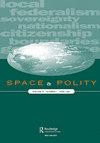边缘在中心:从边界分析拉美地区主义
IF 1.1
Q2 GEOGRAPHY
引用次数: 1
摘要
本文分析了边界在拉美地区主义理论和政策中的作用。这表明,无论是国际关系研究中的区域主义解释性“浪潮”,还是拉美区域一体化政策,都没有认真对待边界问题。因此,它主张将边境地区视为理解国家、地区和全球化之间空间关系的关键政治和认识论场所。尽管一些学术和政治倡议已经开始在拉丁美洲地区主义中解开笛卡尔式的边界解读,但本文认为,可以采取进一步的步骤,将边界(边缘)视为认识论中心。本文章由计算机程序翻译,如有差异,请以英文原文为准。
The periphery at the centre: an analysis of Latin American regionalism from the borders
ABSTRACT The article analyses the role of border in theories and policies of Latin American regionalism. It shows that neither the explanatory ‘waves’ of regionalism in studies of International Relations nor Latin American regional integration policies have addressed borders seriously. Accordingly, it argues for a view of border regions as key political and epistemological places for understanding spatial relations between state, region, and globalization. Though some academic and political initiatives have started to unpack the Cartesian reading of border in Latin American regionalism, the article argues that further steps can be taken by treating borders (peripheries) as epistemological centres.
求助全文
通过发布文献求助,成功后即可免费获取论文全文。
去求助
来源期刊

SPACE AND POLITY
GEOGRAPHY-
CiteScore
4.10
自引率
4.20%
发文量
19
期刊介绍:
Space & Polity is a fully refereed scholarly international journal devoted to the theoretical and empirical understanding of the changing relationships between the state, and regional and local forms of governance. The journal provides a forum aimed particularly at bringing together social scientists currently working in a variety of disciplines, including geography, political science, sociology, economics, anthropology and development studies and who have a common interest in the relationships between space, place and politics in less developed as well as the advanced economies.
 求助内容:
求助内容: 应助结果提醒方式:
应助结果提醒方式:


